Key Takeaways:
- Bariatric surgery is only the first step to your weight loss journey—lifestyle changes are important for long-term success
- Most people lose the majority of their excess weight in the first year after bariatric surgery
- Proper nutrition and supplements are crucial to prevent vitamin deficiencies after surgery
You’ve made it through bariatric surgery—congratulations! But as you’re discovering, the real journey is just beginning. That rumbling uncertainty you might be feeling right now is completely normal. “Will I be able to eat regular food again?” “How fast do you lose weight after bariatric surgery?” “What if I gain back all of the weight?”
In this guide, we’ll pull back the curtain on what really happens after bariatric surgery. From the surprising ways your appetite changes to the emotional rollercoaster you may experience. We’ll walk you through the reality of bariatric weight loss, beyond the statistics and medical terms.
Table of Contents
Understanding Bariatric Surgery
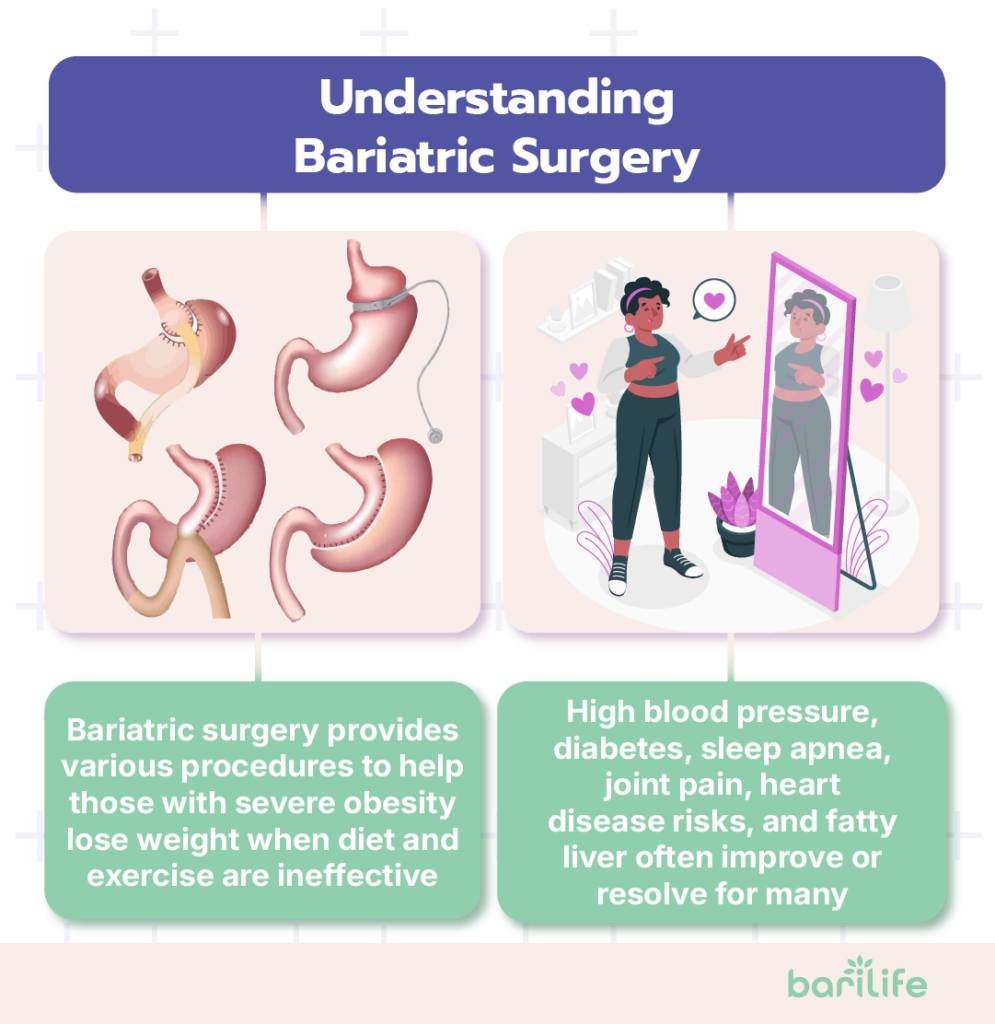
Bariatric surgery for weight loss includes several procedures designed to help people suffering from severe obesity lose weight when diet and exercise just don’t work. But what’s bariatric surgery exactly, and how does it assist with weight loss?
Types of Procedures
There are several types of bariatric surgery, each working in slightly different ways.
- Gastric bypass: This procedure involves making a small pouch from your stomach and linking it to your small intestine. Food bypasses most of your stomach and part of your small intestine, limiting how much you can consume and how many calories your body absorbs.
- Gastric sleeve (sleeve gastrectomy): This procedure involves removing about 80% of your stomach, leaving a banana-shaped “sleeve.” This smaller stomach holds less food and reduces the hunger hormone ghrelin.
- Adjustable gastric band: This procedure places an adjustable band around the top of your stomach, creating a small pouch above the band. This limits how much food your bariatric surgery stomach can hold.
If you’re wondering, “how much weight can you lose with bariatric surgery?” the answer depends on many factors including the type of procedure you undergo and your commitment to lifestyle changes.
Eligibility Criteria
Not everyone is eligible for bariatric surgery. Generally, you might be eligible if:
- You have a BMI of 40 or higher
- Your BMI is between 35 and 40, and you have issues related to weight, like type 2 diabetes or high blood pressure
- You’ve tried losing weight through other methods with little to no success
Health Benefits
Weight loss and bariatric surgery go hand in hand, but the health benefits extend far beyond just dropping pounds. Many people experience improvements or complete resolution of high blood pressure, diabetes, sleep apnea, joint pain, heart disease risk factors, and fatty liver disease. These health improvements often happen quickly, sometimes even before significant weight loss occurs.
Risks and Complications
Like any major surgery, bariatric surgery has risks. These can include:
- Infection
- Bleeding
- Blood clots
- Leaks in your gastrointestinal system
- Bowel obstruction
- Dumping syndrome
- Nutritional deficiencies.
Preparing for Bariatric Weight Loss
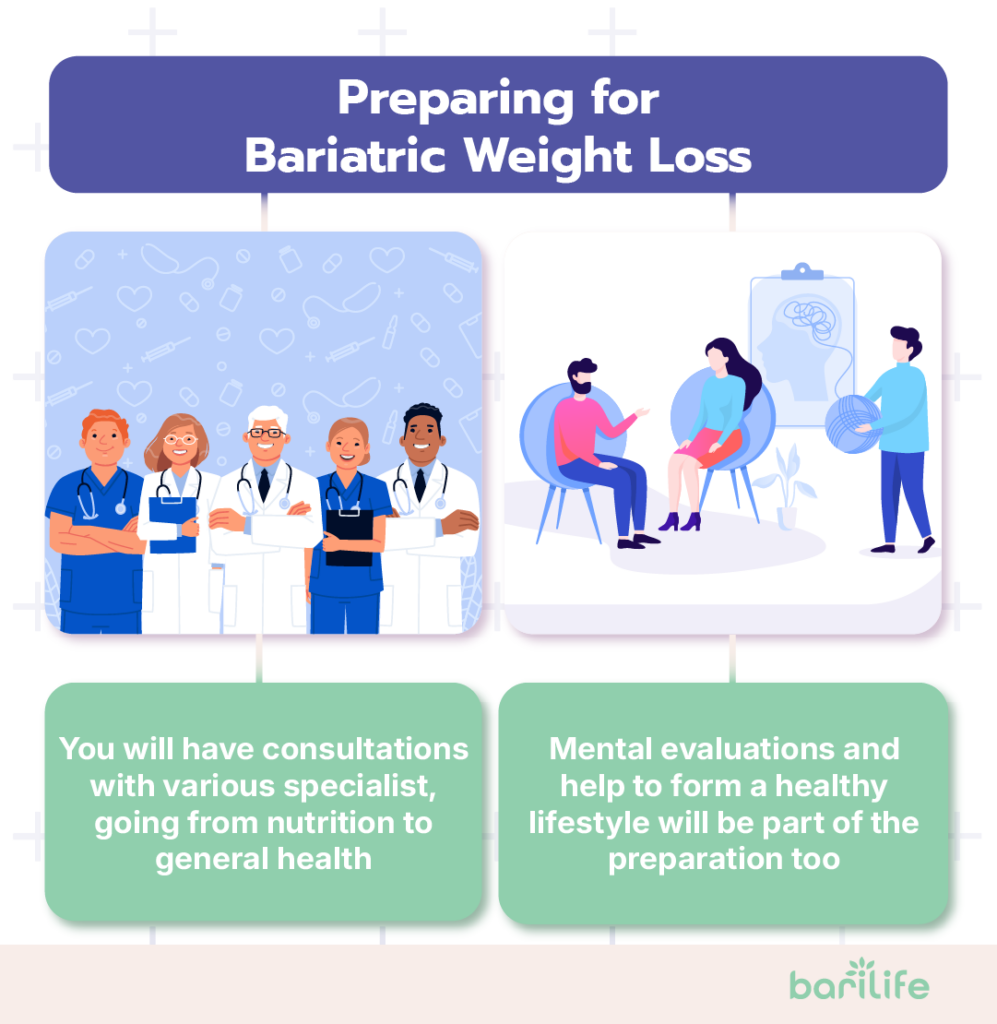
Successful bariatric weight loss begins before your surgery. With enough preparation, you’re setting the stage for better outcomes.
Comprehensive Evaluation
Before surgery, you’ll undergo several assessments. These include
- Physical exams to check your overall health
- Blood tests to check for nutritional deficiencies
- Sleep studies are conducted if sleep apnea is suspected
- Heart tests to ensure you can safely undergo surgery
- Psychological evaluations to check if you’re ready for lifestyle changes
Nutritional Counseling
Working with a dietitian is crucial. They’ll help you understand the dramatic diet changes you’ll need to make and teach you about portion sizes and food choices.
Together, you’ll create a pre-surgery diet plan (often liquid-based) to shrink your liver and make surgery safer, as well as plan for your post-surgery nutrition needs.
Lifestyle Modifications
You’ll need to start adopting healthier habits before surgery.
Begin adding regular exercise into your daily routine and practice eating more slowly and chewing thoroughly. Work on portion control and cut back on high-calorie foods and beverages. If you smoke, you’ll be required to quit before surgery is approved.
Mental Health Support
The psychological aspects of bariatric surgery matter just as much as the physical ones do.
Consider attending support groups to meet others on the same journey and working with a therapist to deal with emotional eating triggers. You’ll also have to develop coping strategies that don’t involve food and prepare for changes in how others might treat you after weight loss.
Post-Surgery Weight Loss & Lifestyle Changes
After bariatric surgery, your life will change significantly. Here’s what to expect with bariatric weight loss.
Dietary Adjustments
Your diet will progress through several stages.
During the first few days, you’ll be limited to clear liquids like water, broth, and sugar-free gelatin.
From weeks 1-2, you’ll move to full liquids such as protein shakes, yogurt without chunks, and thin soups.
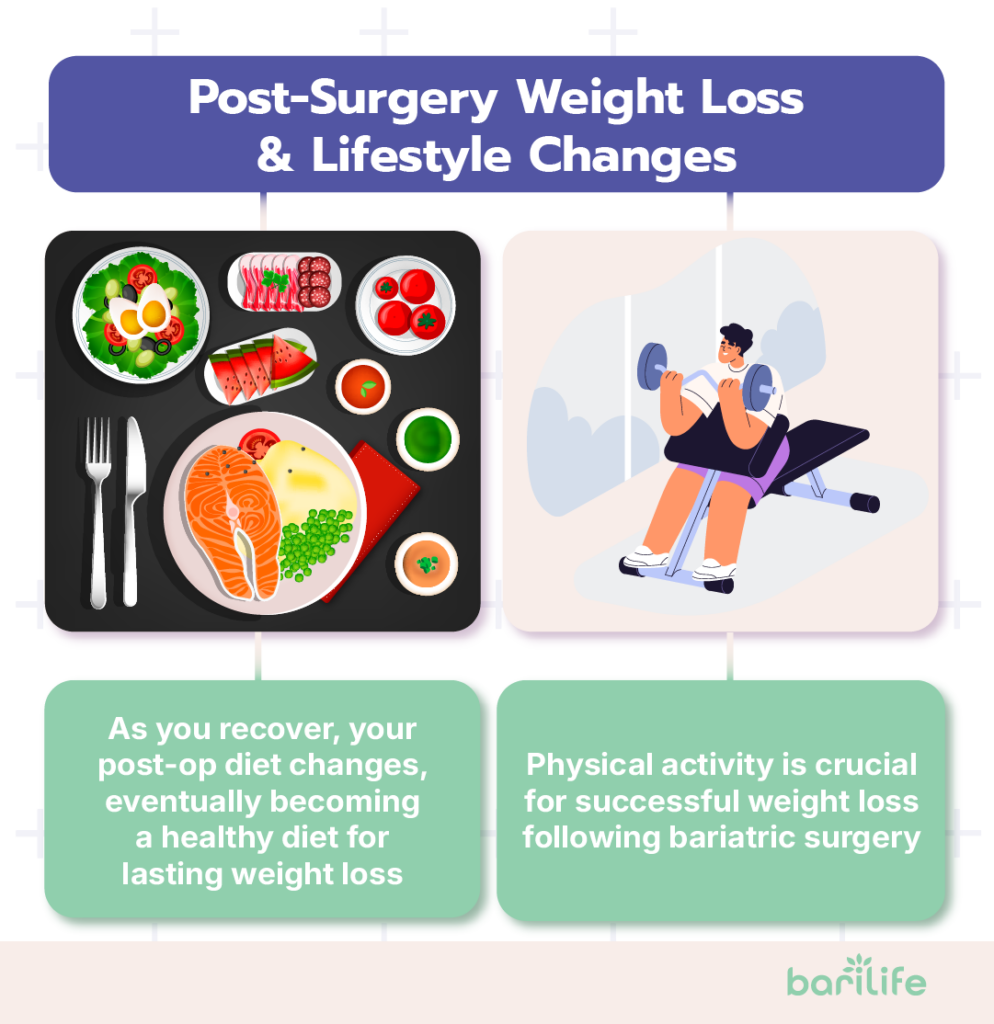
Weeks 3-4 typically introduce soft foods like eggs, ground meat, and soft-cooked vegetables.
After about a month, you’ll transition to regular foods, though in much smaller portions and with a focus on protein.
In the long term, you’ll need to consume protein first (aiming for 60-80 grams daily) and take small bites while chewing thoroughly. You’ll also need to avoid drinking while eating (waiting 30 minutes before and after meals) and limit sugary and fatty foods that can cause dumping syndrome.
Regular Exercise
Physical activity is crucial for successful weight loss following bariatric surgery. You will typically start walking within several hours after surgery and gradually increase your activity as you heal.
Most healthcare providers recommend aiming for 150 minutes of moderate exercise per week and incorporating strength training to maintain muscle mass.
Finding activities you love doing will also help you stick to your exercise routine in the long term.
Routine Medical Follow-ups
Follow-up appointments typically happen at one week, one month, three months, six months, and one year after surgery. These visits include blood tests to monitor your nutrient levels, weight checks to track your progress, and adjustments to your medication as needed.
Psychological Well-being
Bariatric surgery can be tough psychologically, forcing you to deal with complex emotions. Your relationship with food will undergo significant changes, and your body image will evolve as you lose weight.
Some people notice a difference in how their friends and family treat them.
Long-Term Success & Challenges
Here’s what you should know about the long-term journey.
Sustained Lifestyle Changes
For lasting success, you will need to continue following the eating habits you have learned and maintain regular physical activity. Understanding how to lose weight after bariatric surgery isn’t just about the first few months—it’s a lifelong commitment.
Many people find that attending support groups, even years after surgery, helps them stay on track. Using tracking tools to monitor your food intake, exercise, and weight can also help you maintain your results.
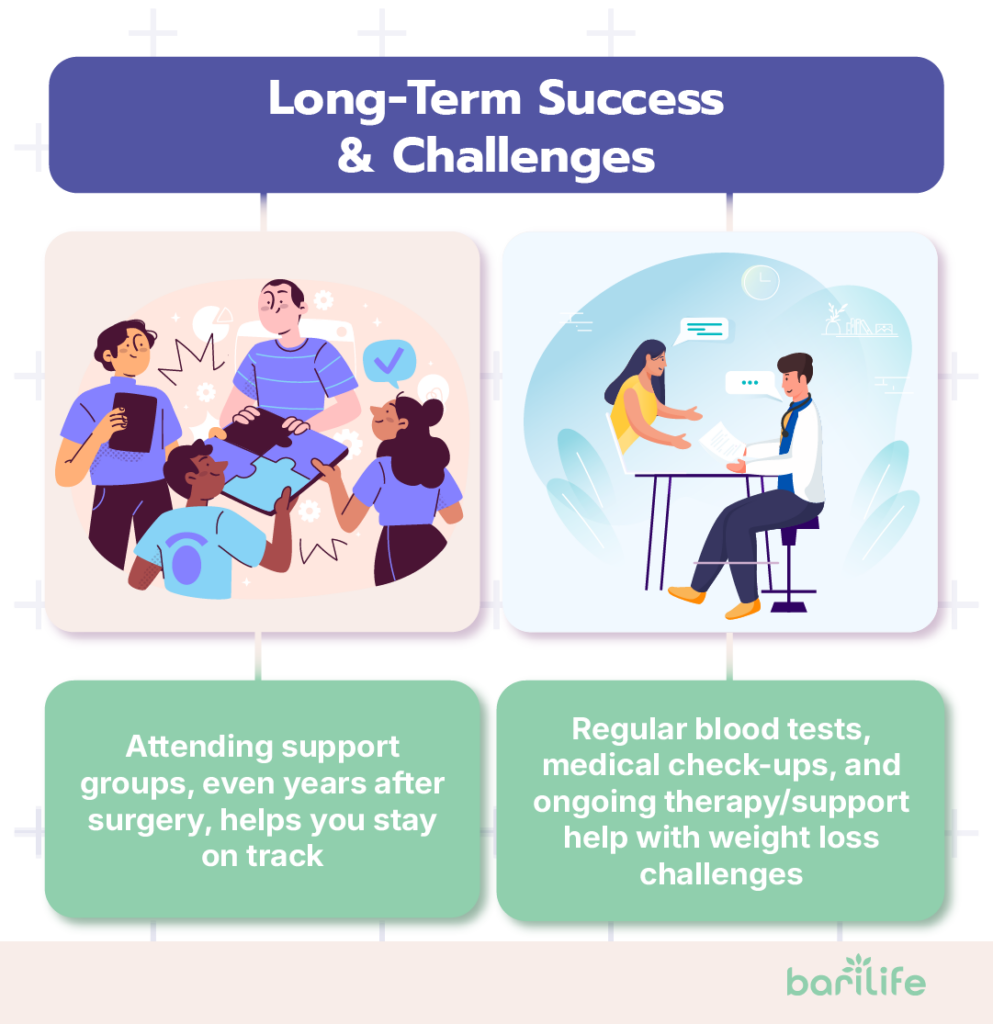
Monitoring Nutrient Intake
After bariatric surgery and weight loss, your body won’t absorb nutrients as efficiently anymore, so you’ll be taking vitamin and mineral supplements daily for the rest of your life.
Regularly getting blood tests to check for deficiencies is also important. You’ll be working with healthcare providers to adjust your supplements as needed to prevent nutrition-related complications.
Addressing Weight Regain
Some weight regain is normal after the first 2 years. If you notice significant weight gain, you have to address it right away by returning to basics with portion control and food choices.
Check for emotional eating triggers that may have resurfaced and consider visiting your bariatric team for an evaluation, especially if you’re struggling.
Mental Health Maintenance
The psychological journey continues long after surgery. Body image issues might arise as your appearance changes, and social relationships may change in unexpected ways.
Depression can also occur even after successful weight loss. You will need ongoing therapy and support to navigate these challenges as they arise.
Alternative Non-Surgical Bariatric Weight Loss Options
Not everyone needs or qualifies for surgery. Here are other approaches to consider.
Pharmacotherapy
Prescription medications can support weight loss. GLP-1 agonists (like Saxenda and Wegovy) help control appetite, while other medications may block fat absorption or reduce hunger.
These work best when combined with lifestyle changes.
Endoscopic Procedures
Less invasive options include:
- Gastric balloons that occupy space in your stomach for 6 months,
- Endoscopic sleeve gastroplasty (accordion procedure) that reduces stomach size without surgery
- The AspireAssist device that removes food from the stomach after eating.
These approaches often serve as a bridge or alternative when bariatric surgery criteria is not met.
Behavioral Therapy
There are structured programs that address the psychological aspects of weight management. Cognitive-behavioral therapy can help identify and change unhelpful thought patterns while also providing strategies for managing stress, emotional eating, and food cravings. These programs often focus on skills for maintaining motivation and handling setbacks.
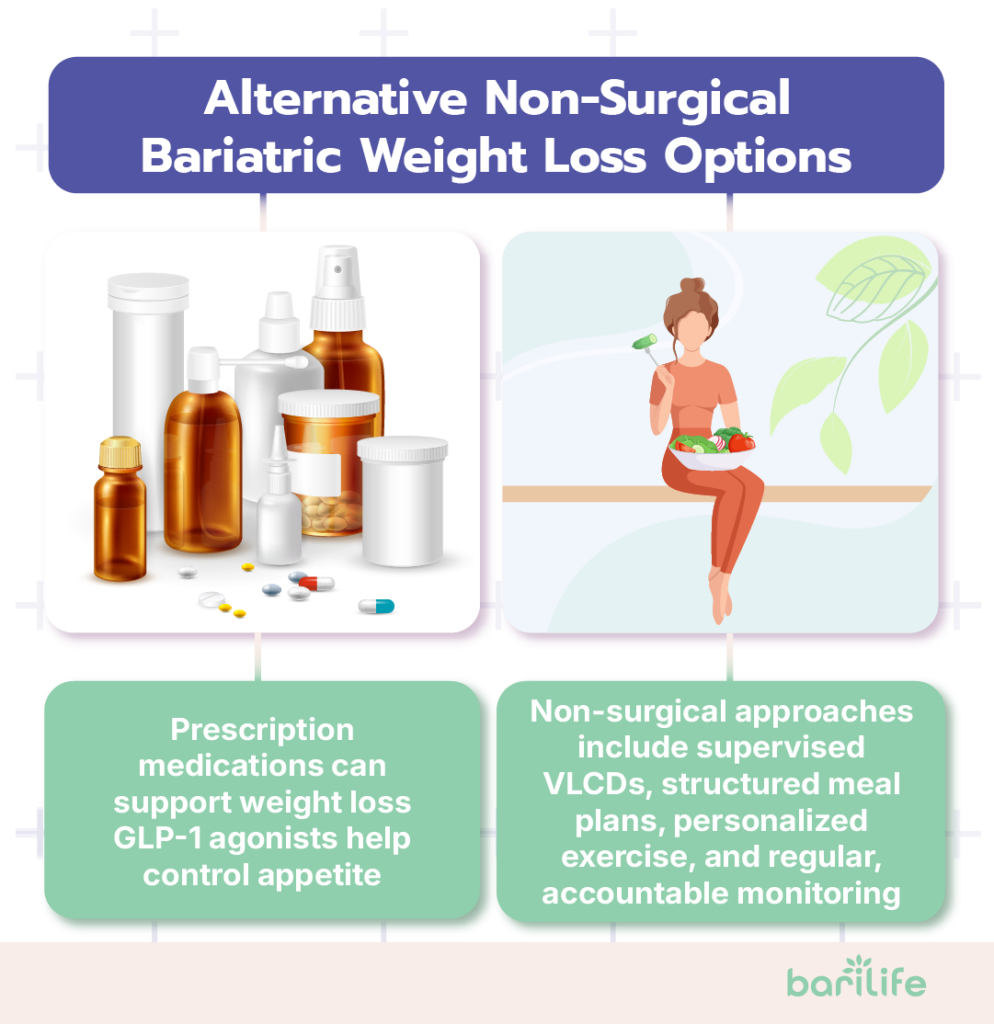
Diet and Exercise Programs
Comprehensive non-surgical approaches include medically supervised very low-calorie diets, structured meal replacement programs, guided exercise regimens tailored to individual needs, and regular monitoring with accountability. While these options don’t provide the dramatic results of bariatric surgery, they can be effective for those who don’t need or want surgical intervention.
Conclusion
Your success after bariatric surgery depends on embracing new eating habits, staying active, taking supplements, and handling both the physical and emotional parts of your journey.
Understanding the average weight loss after bariatric surgery can help reinforce that your journey is unique, but benchmarks exist to guide and encourage you.
Bariatric surgery information and support are essential before and after your procedure. The surgery changes your body, but you must change your lifestyle in order for the results to last a very long time.
How Bari Life Can Help
After bariatric surgery, your body faces unique nutritional challenges that regular vitamins simply can’t address. That’s why choosing the right bariatric vitamins is critical to your recovery and long-term health.
Our products are created by bariatric professionals who understand the specific nutritional requirements after surgery. We offer bariatric multivitamins, including bariatric multivitamin with iron options, to ensure you’re getting complete coverage in just a few easy doses. For those who prefer an easier method, we also have bariatric vitamins chewable and even liquid bariatric vitamin options to suit every preference.
Protein intake is crucial after surgery, and Bari Life makes it simple with great-tasting bariatric protein shakes and bariatric protein bars that help you meet your daily goals. These aren’t just nutritious—they’re delicious and designed specifically for your bariatric needs.
In addition to multivitamins and protein, maintaining bone health is essential. That’s why we provide bariatric calcium chews, making it easier and more enjoyable to maintain your calcium levels. We also offer bariatric probiotic supplements to support a healthy gut, which is especially important after bariatric surgery.
We know many patients also face challenges like thinning hair, so we’ve created specialized bariatric vitamins for hair loss to promote hair health and regrowth.
And when you need a quick, healthy bite, our range of bariatric snacks ensures you stay nourished and satisfied without compromising your nutrition plan.
With Bari Life, maintaining proper nutrition after bariatric surgery becomes simple, convenient, and even enjoyable.
Resources
Adult Activity: An Overview. (2023). CDC.



What are your tips and tricks to post-bariatric success?